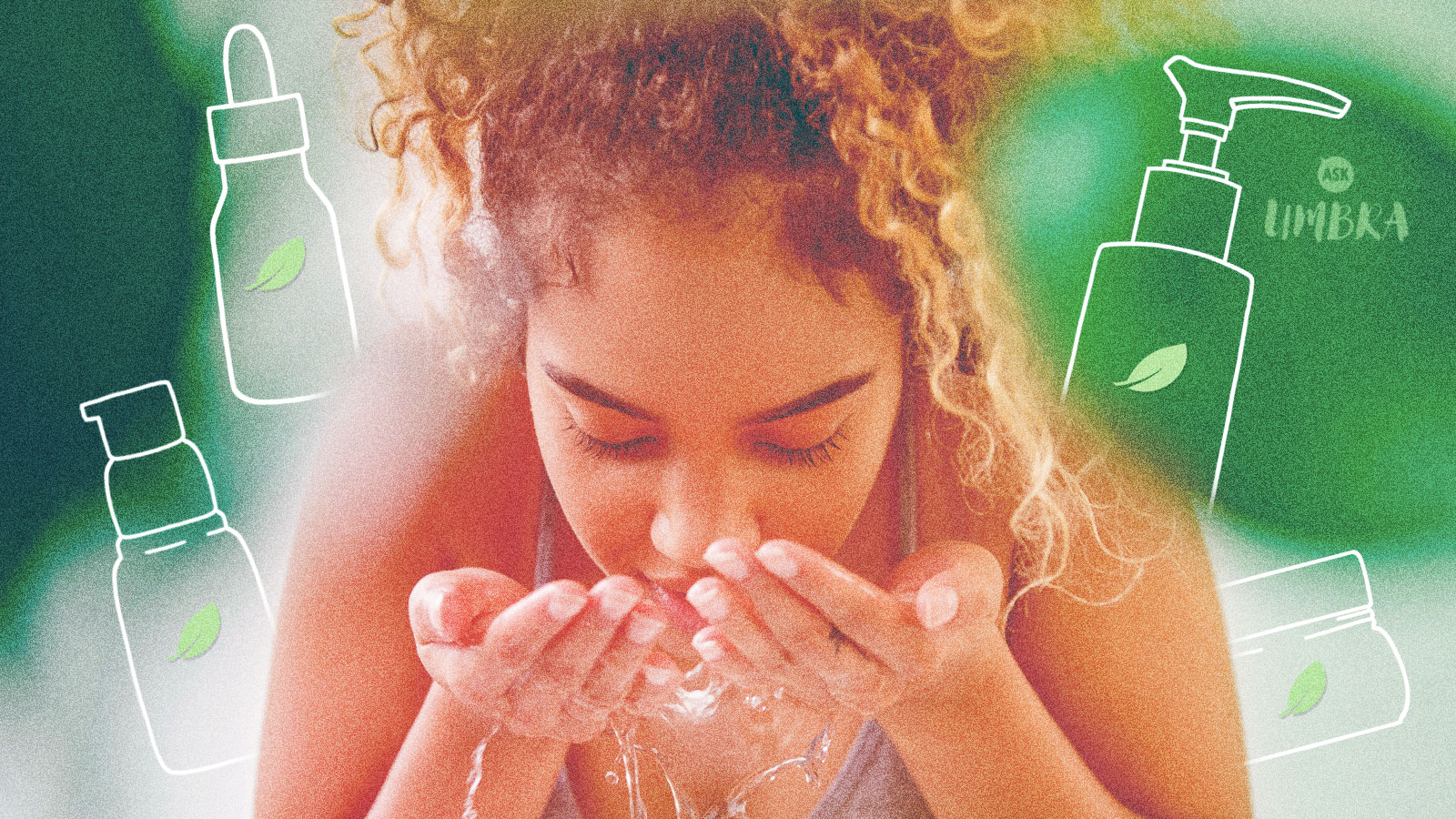Q. Dear Umbra,
A lot of us are feeling extra sensitive and stressed-out, so we’d appreciate your natural skincare tips!
— Blemishes Raging, Eczema Activated, Keratin Overproduction — Ugh! Terrible
A. Dear BREAKOUT,
Stress is the greatest enemy of a clear face. But to tell someone “Don’t stress! :)” in 2020 borders on offensive. We are living through a global pandemic, approaching a presidential election on which much of the future rests, undergoing significant upheaval of our personal and professional lives, and, oh, capping off one of the worst hurricane and fire seasons in recent memory. Combine that witch’s brew of latent stress with the need to wear some not-very-breathable fabric on your face whenever you leave your house, and you have quite the zit recipe.
Even though we are all tired, I feel I must, however briefly, acknowledge some of the issues that might lie beneath the surface of your request. I don’t have the time, space, or emotional wherewithal to fully revisit the Vassar women’s studies seminar I took in 2007, but suffice it to say I sincerely hope your quest for better skin is more rooted in self-care than self-consciousness. I know that when I look in the mirror and discover yet another ominous red lump looming up on my jawbone, I feel very down. Is that me channeling my inner goddess or the patriarchy?
At the moment, I really don’t care! Internalized misogyny aside, it can be very therapeutic to slather your face with marula oil and fantasize about a better world. And, in addition to the chin of a surly 14-year-old, the COVID-19 pandemic has blessed me with many hours of extra time to pick at my face and read the 40 billion pages of internet offerings on “clean skincare.” Come forward, ye who have not spent a late night Googling some form of “how to get rid of a zit overnight with household staples”!
To that end, I asked some of my colleagues at Grist for their best, “natural,” home-ingredient skincare tips. Here’s a smattering of their responses:
“I use straight shea butter for dry skin, and sometimes I wash my face with jojoba or argan oil if I feel like I need extra moisturizing. You can make your own exfoliating and moisturizing sugar scrub pretty easy by combining a cheapo oil with sugar and some essential oils. It’s also easy to make a super rich moisturizer or skin balm (not for face) with oils + shea butter + cocoa butter + essential oils for scent. ” — Amelia Bates, editorial illustrator
“My mom puts grapes on her face every morning for anti-aging, she just cuts them in halves or sometimes mashes them.” — Myrka Moreno, social media fellow
“Aloe is great if you have to deal with random patches of dryness, especially if your skin changes when you’re stressed.” — Angely Mercado, justice fellow
“Witch hazel and tea tree oil are my go-to natural blemish treatments, and I follow them up with a honey-based moisturizer.” — Eve Andrews, Umbra
“I make my own deodorant! It does not work and I have resigned myself to that fact.” — Claire Thompson, Fix program assistant
And we actually made a video on DIY beauty several years ago, if you’d like additional tutorials!
There are benefits to crowdsourcing tips for natural skincare. You are surely aware that as soon as you Google any kind of dermatological question, you are essentially signing yourself up for a year’s worth of ads inundating your Instagram feeds, email inbox, and the blank spaces of your favorite online publication’s webpage: THIS EYE CREAM WILL RESCUE ONE SEA TURTLE FOR EVERY 1,000 SOLD! SERUM FOR YOUR GAPING PORES AND THE BURNING PLANET! A LIP BALM SO CLEAN YOU COULD EAT IT WITH A SPOON!
I advised in a recent column that the “green” purchases that are marketed to you (i.e., that you don’t necessarily need) might not be so great for the planet after all; this is extra clear in the skincare/cosmetics department. Companies have responded to consumers’ demands for more eco-conscious practices by making a wide variety of promises ranging from the incredibly vague to the curiously specific. The nonprofit Environmental Working Group does a pretty comprehensive evaluation of the health and environmental bonafides of skincare products and cosmetics every year, and you can use it as a starting point when evaluating the merits of any product you’re thinking of ordering.
But I have also argued that Earth-conscious and health-conscious are not necessarily synonymous, and “clean beauty” has very much muddled the two. “Plant-based” sounds great, for example — who doesn’t love a good plant — but it doesn’t mean much from an ecological perspective unless you know how those plants are being cultivated and processed.
Then there’s a third boondoggle, which addresses the fundamental issue of eco-conscious consumption: Do you actually need skincare products at all? Is not the entire cosmetics industry founded on the premise of making you believe that a certain retinol or brow brush or lip plumper will make you happier — because being beautiful ostensibly gives you a better life? And while we’re at it, who let the cosmetics industry define beauty in the first place? The patriarchy, at it again!
Generally, dermatologists will tell you that the best skincare routine, should you seek one out, is a simple one with just a couple of products that emphasize moisturizing and sun protection. The science behind this is pretty straightforward, as far as I understand: If you bombard your skin with many different ingredients, it will get flustered and confused and not know how to reach an equilibrium. But enough about me! The other philosophy behind a low-effort routine is that it’s one that you’ll be able to consistently commit to; the human body loves consistency, after all, and humans are lazy.
This is a blessing to anyone preoccupied with the environmental impact of their attempts to subdue their dermatological woes, because as anyone who reads this column knows: When it comes to the products you buy, less is more. And that surely applies to skincare product packaging, which can verge on the criminal for many cosmetics brands. (It’s like a sea turtle wronged Kris Jenner at some point and Kylie swore to avenge her with her cosmetics brand!)
If you decide that your dermatological needs require help beyond your own pantry door, look for companies that value low- or no-waste. Grist editor and occasional Umbra writer L.V. Anderson said she was drawn to the brand Paula’s Choice because it has partnered with Terracycle to recycle empty bottles of their product if you mail them in. Another tip, she added, is to stick to the bar versions of cleansers, as they tend to last longer and have far less packaging than their bottled counterparts.
Other common sense tips I can provide are to avoid ordering products online because the packaging associated with shipping tends to be absurd. Instead, when you find a product you like, stock up in-store! — and make sure you use every last drop of the product within said package. Umbra editor Teresa Chin recommends, for example, cutting off the tops of bottles to better scoop out those last remnants.
And Grist senior fellow Emily Pontecorvo described how she “decided like a year ago to stop buying cotton pads, and now I just put toners and serums on using my fingers and it’s 100 percent the same! Plus, so much of the product was getting soaked into the pad!” Single-use cotton face pads are surely an environmental scourge, since cotton is such a water-intensive crop. But if you’re committed to using cotton pads to apply your facial products, buy reusable ones that you can wash over and over again. If you go that route, be sure to wash them in a gentle, fragrance-free soap; doing the same for your face masks could also alleviate any acne-producing irritation caused by your scented laundry detergent!
But if you find a product that works for your skin and it’s not the most organic, eco-packaged option available, don’t stress. It’s just not worth beating yourself up over! I personally wouldn’t sacrifice the joy that a blemish-free face brings me to guilt over a few hydrocolloid patch peel-offs.
Perhaps that will make some people angry, but I know many of the other decisions in my day carry far more ecological weight than the plastic associated with my zit stickers of choice. Did you know, incidentally, that there is an election coming up?
Glowingly,
Umbra



